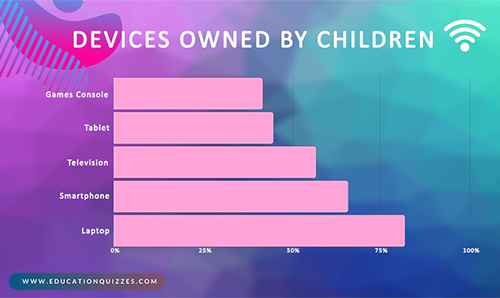Devices Used at Home
Laptops are Favourite Device
 We were a little surprised to learn that of all the devices used at home by children it is laptops that are the favourite. Our survey of 1,146 children showed that 82% of you owned a laptop whilst 66% owned a smartphone and 57% owned a television.
We were a little surprised to learn that of all the devices used at home by children it is laptops that are the favourite. Our survey of 1,146 children showed that 82% of you owned a laptop whilst 66% owned a smartphone and 57% owned a television.
The name 'laptop' was first thought of in the early 1980s to describe a portable computer that might typically be held on a person’s lap. This is distinct from a 'desktop' which, you’ve guessed it, is typically kept on a desk – these computer guys have really original ideas for naming things!
How long do you think it took from the time the first computer was invented to the time that the first laptop was made? We thought that now might be a good time to look at the history of computers so here goes…
SEE OUR LATEST CHILDREN'S SURVEYS HERE
Earliest Computers
Go on, have a guess - when was the first computer invented? According to Wikipedia it happened over 4,000 years ago. The device was invented in Babylon and was called a 'Sumerian abacus'.

If, like us, you think it needs a stretch of the imagination to call any form of abacus a computer then let's jump forward 3,800 years or so to the early 1800s. A gentleman called Charles Babbage (1791-1872) is often called the 'father of the computer' because he invented the first 'mechanical computer'.
There is a working model, built to Charles Babbage’s design, in the London Science Museum but you will see from the picture that it’s not the sort of tool that you and your friends would be likely to have in your bedroom.
Onwards to Alan Turing
Step forwards a century or so from Charles Babbage and we are into the age of Alan Turing (1912-1954). Turing was a brilliant mathematician who was probably the most influential thinker ever in the world of theoretical computer science.
During the second world war Turing worked for the Government Code and Cypher School at Bletchley Park and was head of a team that worked on codebreaking. In particular, he developed a device known as the 'Enigma machine' which helped speed up the breaking of German ciphers. The practical implications of this were that it shortened the war and in doing so it saved up to a million lives. Were it not for Alan Turing and computing, many children of today would not even be here – maybe you are one of them!
Modern Computers
Now let’s take another leap forward to the modern day and see how far we have come…
Someone at Real Clear Science had the idea of comparing the computer used to land the first man on the moon (Apollo 11 in 1969) with a modern iPhone. They found that the iPhone has more than one million times more memory that the Apollo 11 computer. What’s more, the processing speed of the iPhone is over 100,000 times faster than that on the Apollo spacecraft.
The Babbage machine weighs in at over 5 tonnes whilst a modern smartphone weighs less than 200 grams.
The American site at USA Today lets you see how much a computer cost in the year that you were born. For instance, the first 'MacBook Air' in the year 2008 would have cost you around £1,500. Apple still sell a Macbook Air but it is now much improved and will cost you around £325!
Computers Have Become Money-Making Machines
During the last 20 years it is companies based on computing that have seen by far the fastest growth. Computers have the capability of making people very, very rich. Here are a few facts and figures:
- Microsoft started in 1975 and Bill Gates is now reckoned to be worth £84 billion
- Amazon started in 1994 and Jeff Bezos is now reckoned to be worth £88 billion
- Google started in 1998 and Larry Page is now reckoned to be worth £55 billion
- Facebook started in 2004 and Mark Zuckerberg is now reckoned to be worth £52 billion
Note that you need to give or take a billion or two dependent upon the stock exchange on any particular day!
A final thought from Albert Einstein
“Computers are incredibly fast, accurate and stupid.
Human beings are incredibly slow, inaccurate and brilliant.
Together they are powerful beyond imagination”.
MORE SURVEYS THAT YOU HELPED WITH
Survey Results
The survey question this week was 'Which of these devices do you own and use at home?' These are the results from 1,146 children:
| Device | Percentage of Children Owning One |
|---|---|
| Games Console | 42 |
| Tablet | 45 |
| Television | 57 |
| Smartphone | 66 |
| Laptop | 82 |



